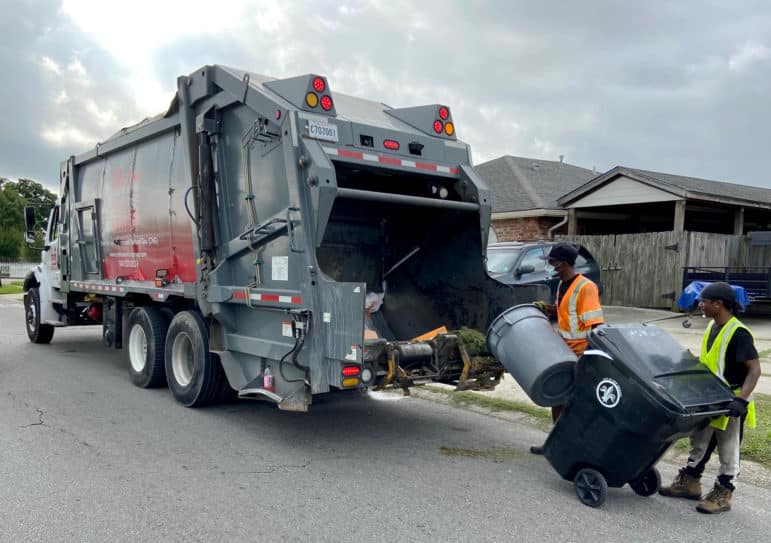
Danae Columbus, Uptown Messenger file photo
Mallory West, left, and Brian Jones empty garbage into a Metro Service Group truck on Wednesday (May 20). (Danae Columbus)
City Council President Jason Williams said last night that “all our essential workers deserve hazard pay during these unprecedented times. Everyone is singing the praises of our front line and thanking them for their sacrifice. They deserve more than just a pat on the back.”
In dozens of towns and cities across America, essential workers on the forefront of the pandemic are participating in protests, walk-outs and strikes to strengthen their demands for hazard duty pay and safer working conditions. Industries including food service, meat processing, retail, manufacturing, transportation and health care have been targeted by labor unions that view the pandemic as a unique opportunity to address core grievances.
For more than three weeks, New Orleans sanitation workers who are contracted to Metro Services Group (also known as Metro Disposal) have been walking the picket line to press for more pay and personal protective equipment, or PPE. Since 2006, Metro Disposal has been one of two African-American owned companies contracted to pick up garbage in New Orleans.
Metro Disposal’s routes cover Lakeview, Gentilly, Bywater and New Orleans East. City Council President Jason Williams has stepped up to mediate the labor dispute. He will be meeting with both sides on Friday (May 22).
While tomorrow’s meeting is focused only on sanitation workers, Williams said, “We as Americans must take meaningful steps to protect those people and industries that have endured the highest physical risk of exposure to this virus.”
On Monday, New Orleans police officers added their voices to the call for a larger paycheck. New Orleans firefighters say they, too, deserve additional compensation.
Metro Disposal strongly asserts that PPE is available every day to every employee but that some choose not to wear face masks. District D Councilman Jared Brossett, whose constituents are serviced by Metro Disposal, confirmed that the company is in compliance regarding PPE.
“I’ve been in communication with Metro Disposal regarding the proper equipment for workers. Metro says they made purchases of over 15,000 personal protective equipment including masks, bandanas and hand sanitizer for all employees,” Brossett said. “As I’ve previously stated, they also support hazard pay for sanitation workers.”
Benefiting from increased market demand, it makes good sense for companies like Walmart and Amazon, grocery stores and pizza chains to boost pay and install safety features. Whether selling online, in-person or through contactless delivery, companies that can safely provide what customers need are still raking in profits.
At the same time, the public sector and its related public and private partnerships are suffering. New Orleans now has one of the highest unemployment rates in the country. Just like after Hurricane Katrina, it could take several years before our tourism-driven economy becomes fully vibrant again. Some restaurants and small businesses may be permanently shuttered.
With many businesses are beginning to reopen, state and local tax collections are down and not expected to rebound for the foreseeable future. The city of New Orleans and the Orleans Parish School Board are among the many agencies trying to identify budget cuts. In a cost-savings measure, Mayor LaToya Cantrell has already reduced garbage pickup in the French Quarter and the Central Business District. Curbside recycling might be next on the list of sanitation-related cuts.
Business owners like Metro Disposal’s Jimmie Woods have been closely monitoring the pandemic and its impact on the company he and his brother Glenn founded in 1982. The Woods brothers were the business’s first employees. They made sales calls during the day and serviced their clients at night using a hand-painted second-hand truck.
In recent years, the duo invested more than $3 million in the most energy-efficient compressed natural gas-powered vehicles and also built a state-of-the-art gas plant to ensure a steady fuel supply. Metro’s maintenance facility is staffed by certified mechanics round the clock to keep the trucks rolling without delay. Offering a mix of residential, commercial, industrial, construction and consulting services, Metro currently operates in nine states.
Metro Disposal’s hoppers, the people who physically pick up the trash, are contracted through a company called PeopleReady, part of the global workforce management leader TrueBlue. Metro pays PeopleReady $16.74 per hour per hopper. In turn, hoppers receive at least $11.99 per hour, the current living wage under city’s guidelines.
Metro also hires men who have recently been released from prison, giving those individuals a dependable stepping stone for re-entering the workforce. Since the pandemic began, the volume of garbage Metro Disposal picks up — and associated costs — has increased as more people are staying home.
Woods says he appreciates his employees and would like to reward them with hazard duty pay but that additional funds are currently not available. He contacted U.S. Rep. Cedric Richmond to suggest the federal government include hazard duty pay for public sector workers like his in the next stimulus package.
Williams commented on the proposal, saying: “The federal government should institute a hazard pay protocol that funds these affected employers so they can properly pay out hazard pay to those citizens who are taking the most risks to get us through this. If the federal government can fund forgivable loans to huge publicly held corporations, they certainly can fund hazard pay for first-responders, RTA drivers, sanitation workers and the like.”
Regarding the ongoing sanitation strike he also commented, “After the past few very strange months we all should understand how critical professional waste collection and disposal really are to our collective health and well-being. It is hard work, and these folks, sanitation workers as well as business owners, take pride in what that do.
“Sanitation workers have risked infection and bring that infection back home to their families every day since this crisis began. It’s in everyone’s best interest that the parties agree on a workable path forward, and I think New Orleans is really rooting for that.”

Danae Columbus, opinion columnist
Danae Columbus, who has had a 30-year career in politics and public relations, offers her opinions on Thursdays. Her career includes stints at City Hall, the Dock Board and the Orleans Parish School Board and former clients such as District Attorney Leon Cannizzaro, City Councilman Jared Brossett, City Councilwoman-at-large Helena Moreno, Foster Campbell, former Lt. Gov. Jay Dardenne, former Sheriff Charles Foti and former City Councilwomen Stacy Head and Cynthia Hedge-Morrell. She is a member of the Democratic Parish Executive Committee. Columbus can be reached at swampednola@gmail.com.
Beautiful article with a few exceptions like people ready pay its employees 10.25 an hr and I am not disputing metro that they bought Ppe but we as hoppers know that metro says we are not they responsibility. They never issued not 1 pair of gloves or mask to hoppers . Like I said wonderful article